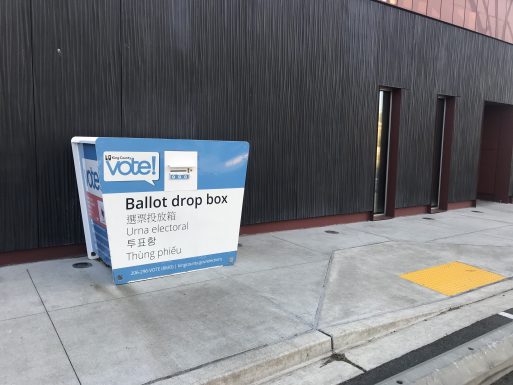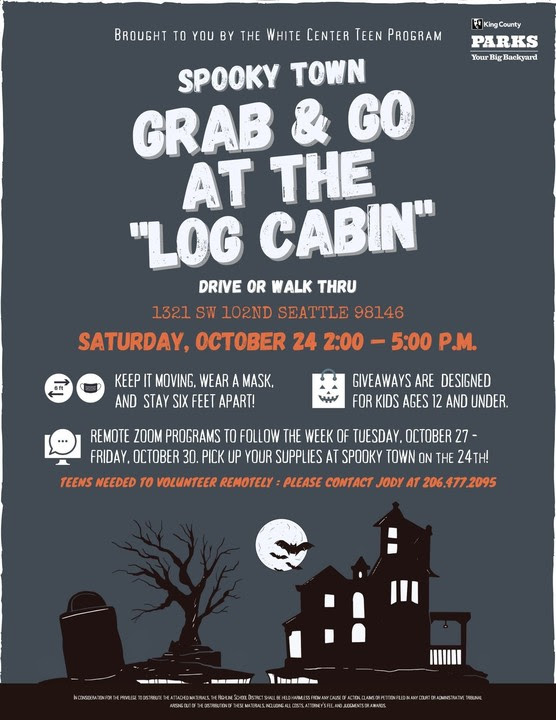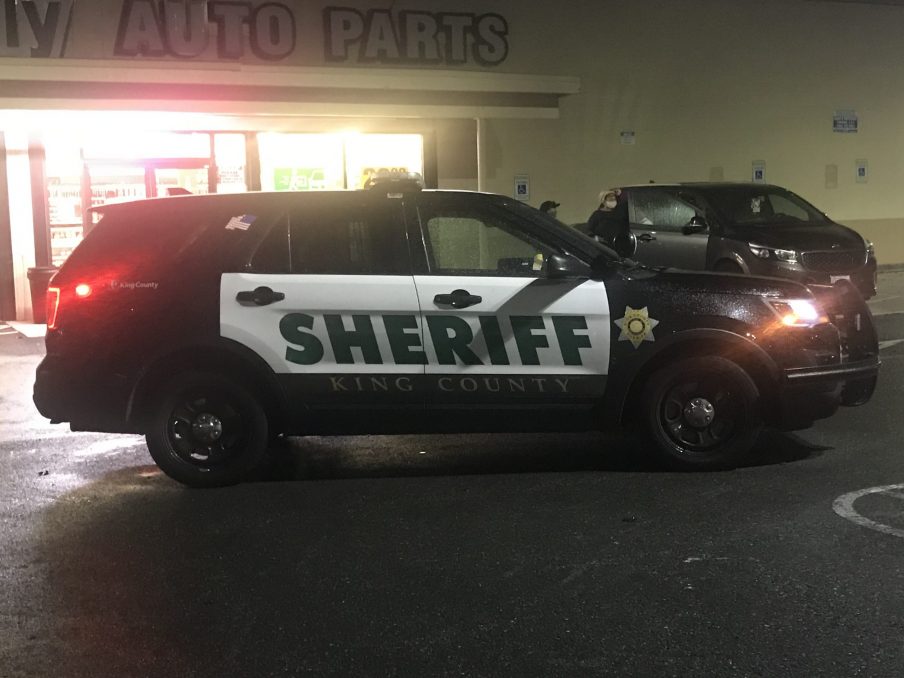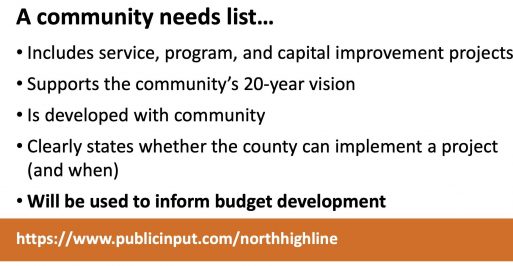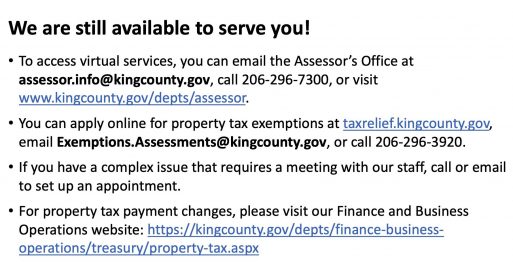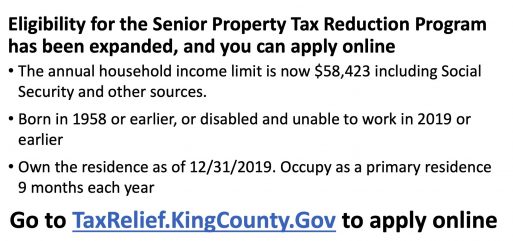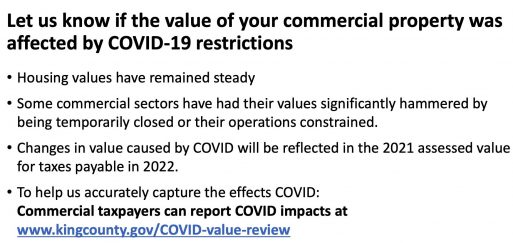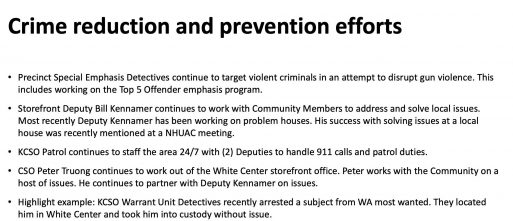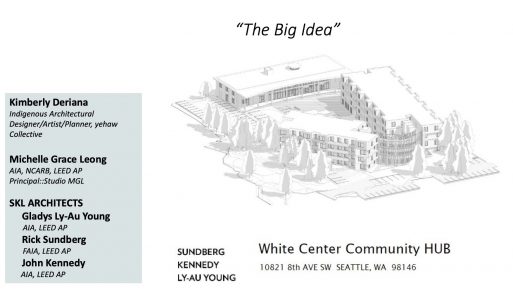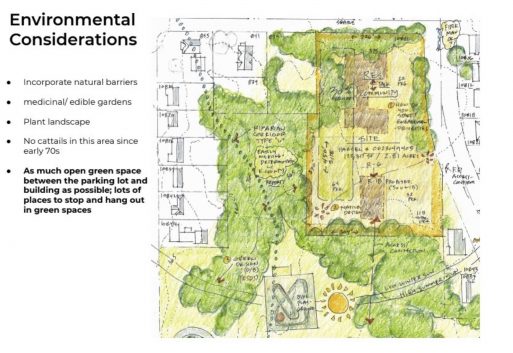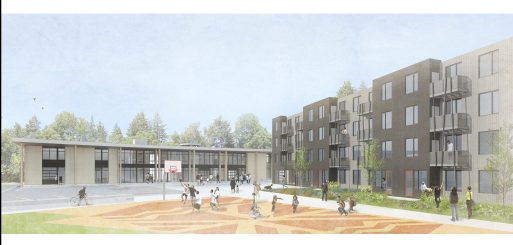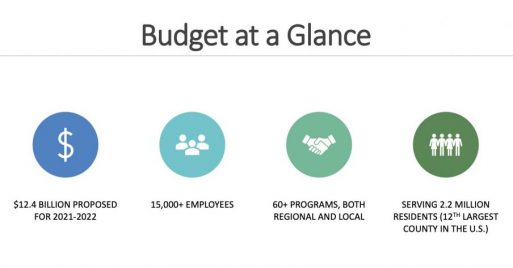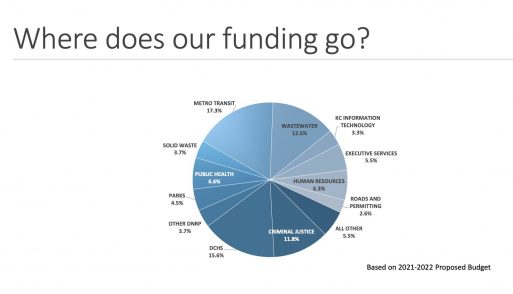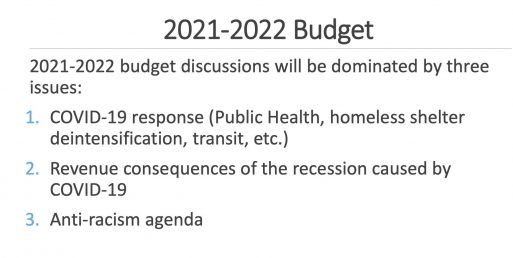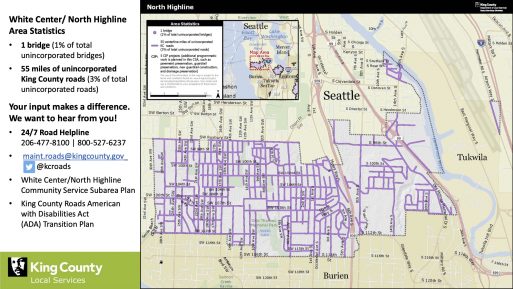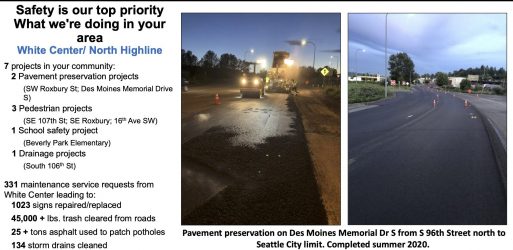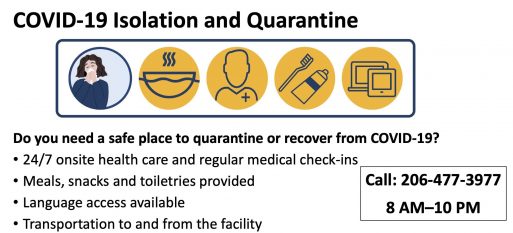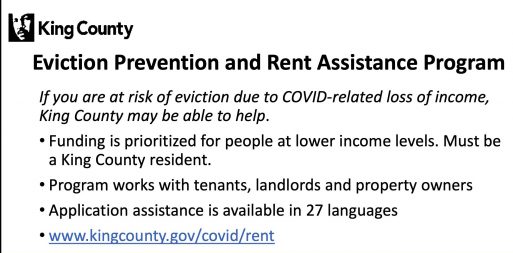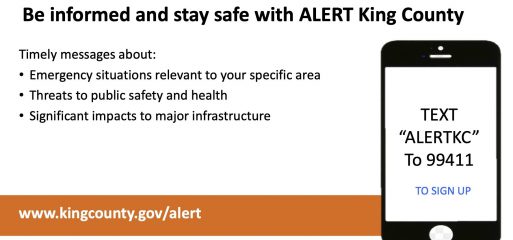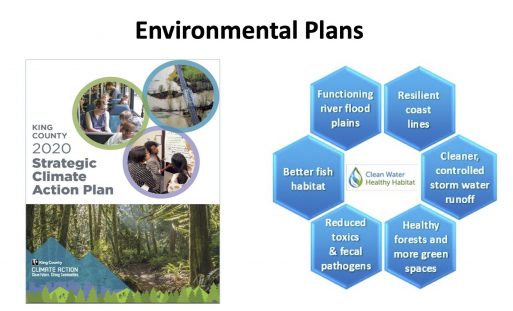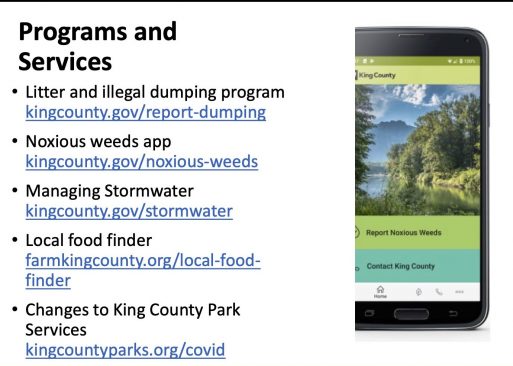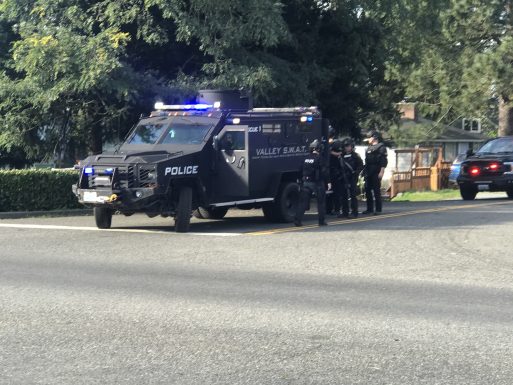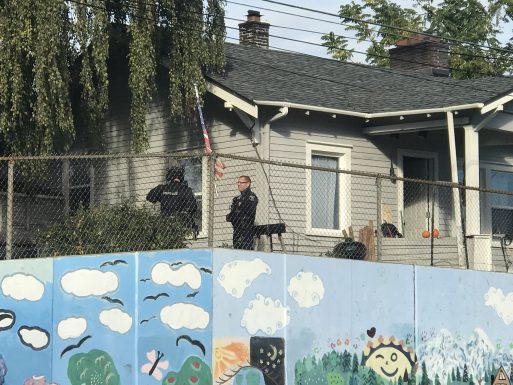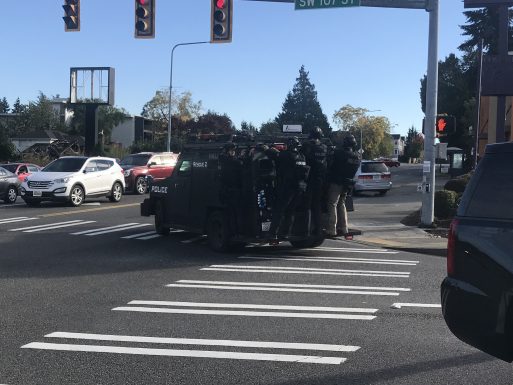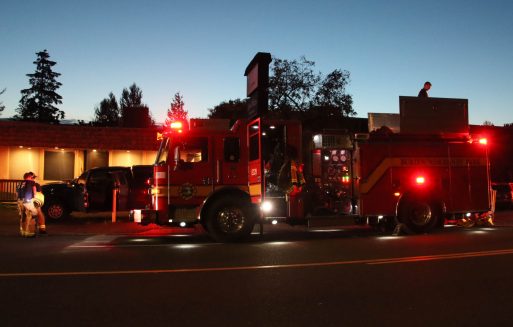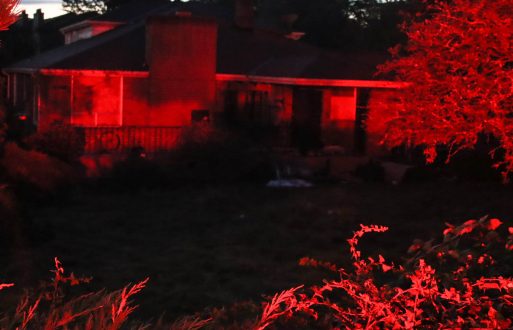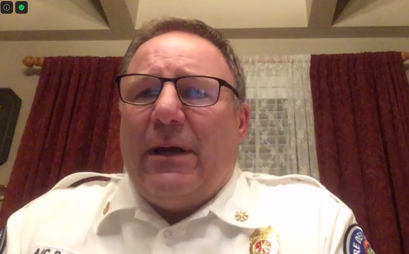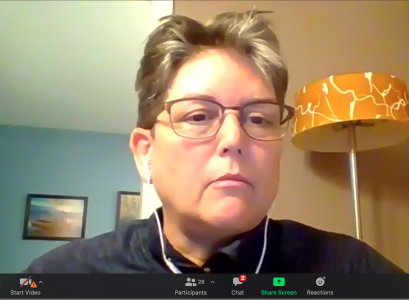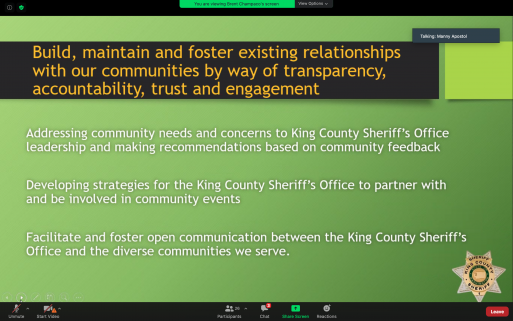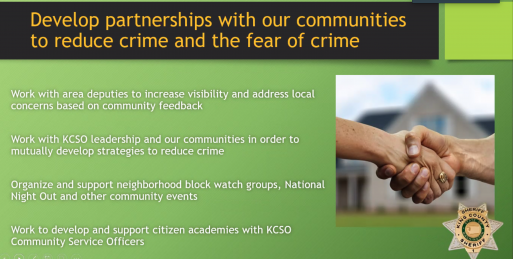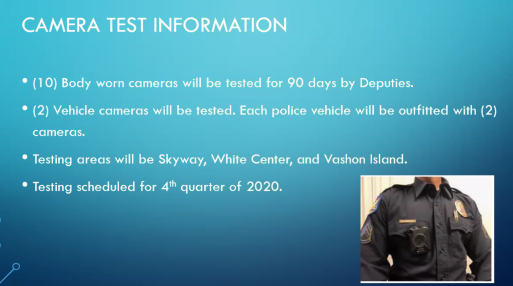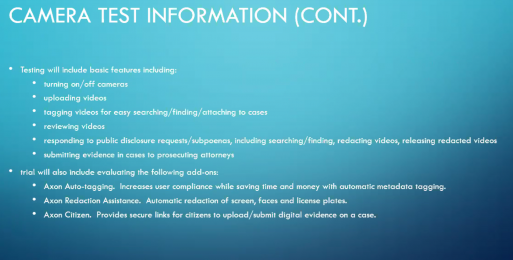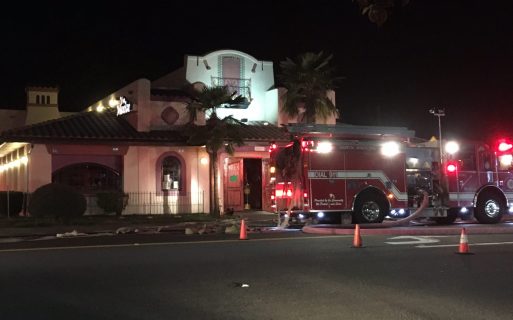That’s the King County Elections drop box outside White Center Library (1409 SW 107th), where you can take your ballot any time, day or night, until 8 pm next Tuesday (November 3rd). As of first thing this morning, 7,049 ballots had been turned in there. In another measure of local turnout – this one, counting ballots received via both drop boxes and USPS mail – almost half the North Highline Fire District‘s 11,258 registered voters have turned theirs in so far – 5,367. Mentioning the NHFD is relevant since its “benefit charge” is one of the issues on the ballot. Also of note, the Highline Public Schools technology levy, and King County charter amendments including whether to revert the Sheriff’s job to an appointed, rather than elected, position.
VOTING: White Center drop-box update, with 1 week to go, and ballot-measure reminders
October 27th, 2020 at 10:33 pm Posted in Election, White Center news | Comments Off on VOTING: White Center drop-box update, with 1 week to go, and ballot-measure reminders
VOTING: Sounders FC VOTE Tour kicks off with White Center stop Tuesday
October 26th, 2020 at 3:47 pm Posted in Election, White Center news | Comments Off on VOTING: Sounders FC VOTE Tour kicks off with White Center stop Tuesday
From Sounders FC:
Tomorrow, Tuesday, October 27, from 8:30-9:30 a.m. PT, former Sounder Brad Evans is visiting the White Center Starbucks Community Store to kick off the Sounders FC VOTE Tour presented by Starbucks. Those stopping by the event can enjoy free coffee samples courtesy of Starbucks while Evans hands out up to 100 high-quality RAVE Foundation soccer balls for youth and takes socially distant selfies with fans. Please note face masks are required.
The Sounders FC VOTE Tour is a three-day event taking place this week to encourage voter turnout and celebrate voting early. Evans is visiting 12 ballot box locations identified by King County Elections as having historically lower turnout in King County. At each location, Evans will distribute “VOTED” stickers and offer the opportunity for fans to take socially distant selfies.
As you likely know, Starbucks is at 16th SW/SW 100th.
HALLOWEEN: Spooky Town on Saturday @ Steve Cox Memorial Park
October 22nd, 2020 at 5:31 pm Posted in Fun, Steve Cox Memorial Park, White Center news | Comments Off on HALLOWEEN: Spooky Town on Saturday @ Steve Cox Memorial Park
As mentioned at last week’s North Highline Town Hall, a special Halloween event is coming up at Steve Cox Memorial Park – this weekend:
Join the White Center Teen Program for some Halloween fun!
Saturday, Oct 24
2 – 5 pm
Steve Cox Memorial ParkFamilies are welcome to drive or walk through the park to pick up goodie bags packed with face masks, DIY arts and crafts projects, official Spooky Town slime, candy, prizes and even pumpkins (while supplies last). Don’t miss the “Pumpkin Patch Maze” on the outdoor basketball court, a Dragon Eye hunt on the multipurpose field, the I Spy Spooky Town Adventure in the windows of the Log Cabin, and a step and repeat photo opportunity on the Log Cabin steps.
Please enjoy this event responsibly by:
Keeping it moving
Wearing a face covering
Staying six feet apart
See you on Saturday!
Parks also announced the installation of “a second set of two Portland Loo-style restrooms near the play area at the park. We’re almost done with construction – one part of the new sidewalk will remain closed until we install a handrail (currently on order). The whole area should be open by late October.”
WEDNESDAY: Public hearing on King County budget proposal
October 20th, 2020 at 9:27 pm Posted in King County, White Center news | Comments Off on WEDNESDAY: Public hearing on King County budget proposal
Got something to say about the proposed King County budget for next year? Wednesday night is your chance to say it. 6-8 pm online, there’ll be a public hearing. This page has information on how to participate.
CRIME WATCH: Helicopter search; stolen car
October 19th, 2020 at 8:09 pm Posted in Crime, Helicopter, King County Sheriff's Office, White Center news | 1 Comment »
Two notes tonight:
HELICOPTER: If you noticed Guardian One circling north White Center for a while earlier this evening – we didn’t know what that as about until we got a tip about a sizable response in the O’Reilly Auto Parts lot at 17th/Roxbury. There, we were able to talk briefly to a King County Sheriff’s Office sergeant; he told us they’re looking for a “fugitive” but would not elaborate further, aside from confirming that the helicopter presence was related. We’ll update if we find out more. (Added 9:10 pm: KCSO spokesperson Sgt. Ryan Abbott says the person they were seeking is “a homicide suspect wanted out of Seattle.”)
STOLEN CAR: Reported by Byron:
Our red 2007 Honda Civic 4-door, license plate 867WSD, was stolen from our driveway. Sometime between 9pm last night and 11:15 am this morning. (10600 block of) 27th Ave. SW. There’s a car seat in the back and a brand new Yakima rack and kayak carrier on the roof.
If you see it, call 911.
County government’s annual check-in, plus Hub project preview: What happened @ 2020 North Highline Town Hall
October 18th, 2020 at 11:18 am Posted in King County, White Center Community Development Association, White Center news | 1 Comment »
By Tracy Record
White Center Now editor
Usually, the county’s annual Town Hall for unincorporated North Highline fills the community room at Seola Gardens with people.
This pandemic year, that’s still out of the question, so instead, county department heads, managers, and other reps – plus one “partner” agency rep with new info about a future major project – filled a screen Thursday night. Otherwise – the format was much the same, minus pre- and post-presentations mingling.
Department of Local Services director John Taylor emceed. County Councilmember Joe McDermott joined “from my basement office in West Seattle.”
First up: Councilmember McDermott noted that after seven months (original WCN report here), the controversial county-owned quarantine/isolation site in Top Hat had yet to host anyone, but the county’s continuing to keep it ready and available. What about the site’s future? He thinks it can serve “an important role” in the area but insists “the county doesn’t have a plan” – he cited ideas he says he’s heard, from housing to open space. He promises that the county will work with the community in deciding the site’s future.
McDermott also spoke about the budget, on which the County Council is working right now. A highlight: $1.8 million in marijuana-tax revenue is planned to be diverted to Local Services, $450,000 of it for participatory budgeting, the rest for “an urban unincorporated King County investment pool.” And he noted the county has had “four supplemental budgets” to deal with COVID response.
He fielded a question about the scooter-sharing program launched two months ago, noting it’s a 1-year pilot project. The program, with scooters from two companies, started in mid-August. Any extension would be up to the County Council. “I’m optimistic about the experiment and hearing from White Center about their experiences.”
McDermott also was asked about the status of the proposed fireworks ban. “The legislation I introduced to ban them in unincorporated King County would mirror most cities … a year ago on 4th of July, we had a tragic death of a North Highline resident because of fireworks,” and that’s why he worked on a ban. It’s been delayed by everyone working remotely – he hopes to get the ban enacted before year’s end, he said, but since it can’t go into effect until a year after passage (that’s a state mandate), even if he does, the ban wouldn’t cover next 4th of July.
Another question: What about a space for the LGBTQ+ community in White Center? McDermott said that’s a great addition to the community needs list and also something that could be discussed in the context of the Sub-Area Plan. (Explained later in the meeting, here’s what the needs list is about:)
The North Highline Subarea Plan is expected to go to the council late next year and be adopted in 2022, McDermott said.
Elections director Julie Wise made the next presentation, saying they’re challenging voters to break 90 percent turnout – you should get your ballot no later than Monday. She said they’re confident the ballots will get to everyone within the 5-day post-mailing window. Ballot drop boxes are open – 73 of them around the coumty, each weighing half a ton – the local drop box is outside White Center Library. “We will have staff emptying those drop boxes every single day.” Before your ballot arrives, get ready by reading the voter pamphlet (all the candidate and measure info is online too). If you’re going to return your ballot via a drop box, please do it BEFORE Election Day, Wise implored. Any questions? You can call 206-296-VOTE. “Vote early, vote early, vote early,” she implored.
Next: Assessor John Wilson explained ways people can reach his office:
He said they’ve received 9,000 applications for tax exemptions this year and they have a backlog – if you are waiting and need a deferral for the second-half property tax payment, to January 31st, apply by next Monday (October 19th).
Regarding property values, COVID has not had a significant effect on residential values; they’re still watching to see how the West Seattle Bridge closure will affect area values. Values have gone down a bit in “near-in” areas like downtown, West Seattle, White Center, 1 to 5 percent, as a “market correction” more than anything.
Eligibility for the senior tax reduction has been expanded:
Now – a very different picture from residential – the Assessor’s Office wants to hear about impacts on commercial property:
Then, on to law enforcement. From the King County Sheriff’s Office Southwest Precinct, Major Jeffrey Flohr presented. He went through several topics, some of which he discussed at the previous week’s North Highline Unincorporated Area Council meeting (WCN coverage here), plus some general crime prevention/reduction notes:
he gave some light on what happened at 17th and 107th earlier in the day – see our separate report here. He had high praise for White Center Deputy Bill Kennamer, calling him a “rock star” and saying he’s safe from budget cuts. He said two deputies are usually working in the WC area, but they also back up the Skyway area, and vice versa, so a big problem in either area can have up to four deputies on it. Peter Truong continues working as a community deputy.
Maj. Flohr also mentioned that online reporting is back (for non-emergencies) and is available in more than 10 languages.
The camera test program will be “out of this precinct” and it’ll likely start in November/December, as he detailed at the NHUAC meeting.
A question answered by Major Flohr: Noise from modified vehicles – said the attendee, “it’s not a victimless crime … my family and others pay the price for the decision not to address this crime.” The attendee wonders what’s being done about it. Maj. Flohr said deputies are encouraged to go after that kind of violation when they see, or hear about it.
Another question: What funding will replace the marijuana-tax money that’s being moved? Nothing – but, he said, it won’t affect the patroling availability in WC. Councilmember McDermott said the pandemic recession is causing cuts in various county departments but this isn’t an additional cut – service levels will be maintained.
Also: What do you do when you think you hear gunshots? Call 911. That will help them triangulate where it might have happened. DON’T call the non-emergency line – that won’t.
Aaron Garcia of the White Center Community Development Association provided an update too, mostly focused on “The Hub,” the project long in the works at 8th/108th, where the White Center Food Bank and Mary’s Place shelter are now. (Here’s his full slide deck.) Of the agency overall, Garcia explained, “We wear many hats .. I like to explain the CDA as four buckets of support … family development …economic development … community building … youth leadership development (like) White Center to White House …” Since the pandemic began, they’ve distributed more than half a million dollars to community members. He showed a rendering of the project at 8th/108th:
He said a Native architect is leading the project. Garcia also showed the principles guiding the project, dubbed the White Center Hub, and its environmental context:
“We have to be sure we’re being good environmental stewards of the land,” he said, ensuring that they preserve trees on the site, for example, and ‘actually centering everything around that Madrone tree in the middle,” with a recognition of the “seven generations” Indigenous concept. “We’re trying to … ensure this will be one of the first Net Zero affordable-housing projects.” Another preview:
WCCDA, Southwest Youth and Family Services, the YES Foundation, Be:Seattle will all be partnering at “The Hub.”
Back to county staff:
Susie Levy provided a COVID-19 response update. Nearest testing sites: Tukwila and West Seattle (Southwest Athletic Complex). Rates are rising across the county, 92 of 100,000 recently, almost four times the rate they’re hoping for, and the North Highline rate is about 200 per 100.000. She discussed the racial inequities of how COVID-19 affects areas. “We’re committed to implementing a racially equitable response to this crisis.” Levy also touted the King County health services available in the area.
Next, Dwight Dively provided a budget primer, since the County Council is in the thick of budget review right now.
One key point – outside assistance for COVID relief currently ends at year’s end, and if more doesn’t come through, that’s going to put an end to many things. While the pandemic has meant a decline in demand for some things like transit, there’s been increased demand for other things, like health services. He also spotlighted the anti-racism focus of the budget. If you have budget input, get it to Councilmember McDermott!
First question after Dively’s presentation: What’s up with the West Seattle Bridge and its impacts on White Center? McDermott fielded that. He mentioned that the City of Seattle’s been focusing its mitigation efforts on its own area but he’d be glad to surface concerns – get him details.
Second: White Center needs more sidewalks.How can walking be made safer? Dively said that’s the kind of thing that the money earmarked for “capital investment in the unincorporated area” could be used for. McDermott mentioned various transportation-funding challenges.
So “why is the county intent on increasing density in North Highline” if it can’t cover the needs? Taylor said the county’s Growth Management Act didn’t contemplate urban unincorporated areas and ways to equitably share tax revenue to cover their needs. Taylor also noted that a new roads director has just been hired and one of her attributes is a “deep knowledge” of funding, as they work on ways to get needs covered.
Roads Division: Lydia Reynolds-Jones mentioned the 8th/102nd roundabout, road signs helping people understand how to use it:
She also had some stats – WC has 3 percent of the unincorporated area’s total road mileage.
They’re also working on an ADA plan for the entire county. There’ll be a public comment period for the draft plan starting in December. And she showed a list of projects under way now, plus some miscellaneous stats:
Attendee question: Are sandbags available? Yes, Renton’s the closest site – more info here.
From the permitting division, Jim Chen explained everything can be done online.
Department of Community and Human Services‘ Mark Ellerbrook – the county’s second largest department “by budget” – had more to say about the quarantine/isolation facilities – if you need to isolate or quarantine and can’t safely do it at home, call!
If you need rent assistance, here’s the program for you:
And he noted the two Anti-Displacement Workshops coming up for North Highline and Skyway-West Hill, October 17th (this Saturday) and November 7th – find out about them here.
Question for him – besides a workshop, what strategies are they pursuing to fight displacement? Discussing strategies like Community Land Trusts and inclusionary zoning – where a project has to include a certain amount of affordable housing 0 are strategies that’ll be discussed at the workshop, he replied.
He also was asked during the meeting: What about the fair-housing assessment? It’s not ready yet, he said.
Then came an emergency preparedness presentation by Michelle Chatterton. She recommended hazardready.org, signing up for Alert King County as well as flood alerts. To sign up for Alert KC, text ALERTKC to 99411:
DNRP deputy director Mo McBroom reviewed environmental efforts.
She also talked about Parks projects – the 5-acre site we featured earlier this year; improvements for the White Center Natural Area (a pathway) and at Steve Cox Memorial Park, basketball-court improvements plus isntallation of two Portland Loos, Plus, she said there’ll be a “Spooky Town Hall” event at Steve Cox on October 24th. And she had some resource links:
Taylor concluded with a fervent wish that the Town Hall will be back to an in-person event next year.
P.S. See all the county slides from the meeting here.
CRIME WATCH: About the 17th SW/SW 107th SWAT raid
October 15th, 2020 at 8:09 pm Posted in Crime, White Center news | Comments Off on CRIME WATCH: About the 17th SW/SW 107th SWAT raid
Thanks for all the tips. We got to this scene at 17th SW and SW 107th, just west of the mini-mart, just as the SWAT operation was wrapping up. Some research revealed that it wasn’t a King County Sheriff’s Office operation – it was led by Renton PD. They weren’t able to provide us information immediately – but we just got some from KCSO’s Major Jeffrey Flohr, speaking at the North Highline Town Hall that we’re covering right now. He said the operation was indeed in partnership with Renton PD – it started with officers pulling over a car last night and finding 10 pounds of meth, leading to warrants being served today, including this one.
Maj. Flohr said several people were taken into custody today at locations including this one, and that drugs and money were seized.
We’re hoping for additional info from Renton PD tomorrow.
Early-morning fire at vacant house on 16th SW
October 15th, 2020 at 10:25 am Posted in Fire, White Center news | Comments Off on Early-morning fire at vacant house on 16th SW
Big callout early this morning for a fire on 16th SW, just south of the gutted site that was Yarington’s Funeral Home. This time, the fire was in a vacant house.
Firefighters at the scene told us no one was hurt, and damage was limited to the back side of the house. We’ll be following up on the cause.
THURSDAY: King County Town Hall for North Highline (updated!)
October 12th, 2020 at 12:30 am Posted in King County, White Center news | 4 Comments »
12:30 AM: It was announced so long ago, you might have forgotten about it – but it’s almost here – the next King County Town Hall for White Center and the rest of North Highline. It’s planned for this Thursday, October 15th, 7 pm, online. You can connect via Zoom or dial in via 253-215-8782. Meeting ID: 965 1297 0751. (If you want an idea of what the meeting will be like, here’s the slide deck from the one held for Fairwood last month.)
ADDED 10:34 AM: We’re told the county is working on NEW connection information, so we’ve crossed out the link above, and will add the new link/info when we get it.
ADDED TUESDAY AFTERNOON: Here’s the viewing/listening info:
Users can join via Zoom at https://kingcounty.zoom.us/j/95932613768 (case-sensitive passcode is VOTE2020!).
They can also join via phone by calling 253-215-8782 and providing the meeting ID number: 959 3261 3768 (passcode 900924959).
Election in the spotlight as public-safety leaders visit North Highline Unincorporated Area Council’s first online meeting
October 11th, 2020 at 2:20 am Posted in King County Sheriff's Office, North Highline Fire District, North Highline UAC, White Center news | 1 Comment »
By Tracy Record
White Center Now editor
The North Highline Unincorporated Area Council has finally arrived in the world of online meetings, and the first one, this past Thursday night, was as info-packed as their in-person meetings have historically been.
Though this one spotlighted public safety, with leaders from the North Highline Fire District and King County Sheriff’s Office, the real theme was the November 3rd election, with both departments having a lot at stake in ballot measures on which you will be voting.
NORTH HIGHLINE FIRE DISTRICT BENEFIT CHARGE: Assistant chief Ray Pettigrew opened by noting he has been with affiliated Fire District 2 for 35 years, and explained how the two districts consolidated at the start of last year after many years of cooperation.
He talked about the “benefit charge” changing the way NHFD is funded, starting six years ago after its 2014 passage, to take care of the problem with tax-exempt properties not contributing to the district funding. And he listed everything it’s enabled, as voters get ready to decide whether to renew it for 10 years. The charge “spread the cost out, made it more equitable,” Pettigrew explained, and led to a small decrease in what homeowners pay. The charge enabled the consolidation, and also led to a rating agency upgrading the department’s rating, which is good news for property owners’ insurance rates – the rating is now a 3 (1 is the best). The department also was able to buy two new fire engines that are based at Station 18. “We’re a very busy fire department,” with 11,000+ calls last year, he said, and the engines that were replaced had a lot of miles on them.
The stable funding also has enabled them to station an aid car at Station 18 most days – “it increases our ability to answer emergency calls by almost 50 percent.” They’ve upgraded air packs, and added a public educator, too. Also: A local firefighter is helping with the COVID-19 testing area that has been opened in Tukwila; Pettigrew said they were looking for other sites, maybe even White Center, but couldn’t find an available property. King County is reimbursing them for the firefighter’s work. Last but not least, they’re working on an “FD CARES” response unit – “usually an SUV” with a firefighter and nurse or social worker – to answer certain kinds of “low-acuity calls and works with the person to address their needs in a more appropriate manner.” King County Public Health has provided some funding for this. They’re hoping to have the unit up and running early next year. “We think we’ve been very good stewards of your tax dollars,” summarized Pettigrew, pitching for the renewal.
What if it’s not approved? asked NHUAC’s Barbara Dobkin. Reply: The property tax rate would go back up, and the FD would have to re-evaluate what it’s doing. What’s the rate and is it different from the last one? It’s been fairly consistent and is expected to continue that way – “approximately $1.50 per thousand” (dollars of property valuation).
KING COUNTY SHERIFF: KCSO sent several reps to the meeting, starting with the sheriff herself, Mitzi Johanknecht.
She talked about the every-decade county-charter-amending process. Two amendments on the November 3rd ballot would affect KCSO: Amendment #5, which would change the sheriff back to an appointed, rather than elected, position, more than 20 years after the previous change. She’s the fifth elected sheriff, in her first term, which started in early 2018. If Amendment #5 passes, the County Executive would appoint the sheriff, with County Council approval. Then the council put Amendment #6 on the ballot – “having an elected sheriff, but with conditions … that the King County Council would create an ordinance … that determines the roles and responsibilities of the sheriff.” Currently, state laws regulates sheriffs’ roles.
Dobkin mentioned hearing County Executive Dow Constantine talk about the measure on a podcast and say that since people who aren’t in the sheriff’s jurisdiction get to vote for them, changing the law made more sense. Johanknecht noted that other countywide officials are voted on by all county voters too. But, she noted, KCSO does have countywide responsibilities – Metro and Sound Transit policing, among other things. “I also think it’s important that if you’re voting for a sheriff, the sheriff should have a standalone opportunity to represent you.”
If it went to an appointed position, might that lead to cuts/changes? Johanknecht said the COVID-19 crunch has already required some cuts, so she cut some vacant positions, “the least amount of FTEs possible” so it wouldn’t harm 911 response and crime-solving. NHUAC’s Liz Giba said she’d heard the marijuana-tax money had been pulled from KCSO – was that true? The sheriff said that’s a complicated issue but it’s not resulting in any cuts/changes. She also noted that 58 percent of the KCSO budget is revenue-backed – maybe the only county agency that brings in this much money helping cover its budget.
What sort of anti-racism reforms has KCSO been working on? The sheriff said reform is one of the major things she ran to accomplish. She says her deputies now have “less-lethal tools” and that they’ve developed new policies for the critical-incident review board, plus they’ve been training in de-escalation and crisis intervention – 48 hours of the latter, “years ahead of what the state is going to demand.” They’ve also gone through implicit-bias training, and are wrapping up investigations of social-media posts that drew attention and concern. She said the issue has made her job “the most important thing I’ll ever do in my life.”
The budget includes full funding for the KCSO storefront locations, including White Center, she said, in response to a question.
She was followed by Manny Apostol, the new community-engagement specialist for KCSO, a longtime department employee. Listening to communities is his task – here are the slides outlining what he’ll do:
He was asked how he’s working on rebuilding trust with Southeast Asian communities in the wake of the Tommy Le killing. He said he’s been reaching out to groups.
STOREFRONT DEPUTY BILL KENNAMER: He talked about a problem house in the 1800 block of SW 98th that’s finally been cleared out – the eviction moratorium pushed the handling of the situation back several months. They were evicted “due to the criminal activity associated with the house,” he said. “That was the worst house in White Center right now,” he said. Among other things, one of the people associated with the house “was a murder suspect with a $2 million warrant.” Kennamer said one neighbor told him he’s had the first night in a long time that he wasn’t awakened by some trouble at that house. But there are others, it was noted.
Other wide-ranging discussion included the murals on many businesses being a graffiti-vandalism deterrent.
Dobkin also mentioned traffic issues diverting off Roxbury, which in turn is a lot busier because of the West Seattle Bridge closure. Kennamer agreed, “The traffic is absolutely ridiculous” and “going to be frustrating for a very long time.” Dobkin said it’s a safety issue with people “flying through our streets” on streets without sidewalks. Kennamer said he’d reach out to Roads – maybe a stop sign on 106th could help, “so they can’t pick up so much speed.” He also advised “don’t walk with your back to traffic.”
What about mail theft? Kennamer was asked. “If you see it, call us quick, because they’re gone quick.” Locking mailboxes can help but some people even use saws to cut them down.
MAJOR JEFF FLOHR: He’s now the KCSO Southwest Precinct commander. The area always has at least two deputies on duty, he said. He started out talking about the “use of force” dashboard, which he said would show “how rarely we use force.”
His main topic: White Center is one of the areas where KCSO is about to run a pilot camera program – in-car and body-worn. 10 deputies will be using the cameras for 90 days, working in different areas.
He went over the functions and policies they’ll be testing.
At the end, they’ll evaluate and document what they learned, “identify the features we want if funding is provided for full implementation” – right now, it’s NOT budgeted.
Flohr also said they’re “ready to go” with the LEAD program in White Center/North Highline, just waiting for some documentation with a service provider to be finalized. Asked to refresh memories, he gave an example – say deputies respond to a mentally ill shoplifter, they deal with a team of people trying to get that person help, “trying to keep people out of jail and get them the services they need … it’s exactly what the communities have been asking for, they just don’t know that we’ve been doing it.”
CHIEF JESSE ANDERSON: He talked about “8 can’t wait” policy changes: No chokeholds unless it’s a force-type situation “last resort,” de-escalation, requiring warning before shooting, duty to intervene, no shooting at moving vehicles (unless deputies are trapped), among other things.
Regarding policing reform, he acknowledged that many of their calls are more “quality of life issues” than crimes, but he also said staffing is at the lowest level it could be while still allowing them to respond to calls.
NEXT MEETING: NHUAC plans to continue via Zoom for the foreseeable future – the meetings are usually first Thursdays at 7 pm – watch nhuac.org for updates. Next time, the North Highline Sub-Area Plan will be a spotlighted topic.
FOOD/DRINK: Anju closing temporarily after Sunday
October 10th, 2020 at 7:28 pm Posted in Beverages, Businesses, Food, White Center news | Comments Off on FOOD/DRINK: Anju closing temporarily after Sunday
Tomorrow’s your last chance for a while to enjoy what White Center’s bar/eatery Anju offers:
Anju is at 9641 15th SW.
THURSDAY: Public safety spotlighted @ North Highline Unincorporated Area Council
October 6th, 2020 at 9:56 am Posted in King County Sheriff's Office, North Highline Fire District, North Highline UAC, White Center news | 4 Comments »
As previously mentioned, the first pandemic-era North Highline Unincorporated Area Council is set for this Thursday, October 8th, online. Here’s the announcement with full details:
The Opportunity to Be Informed, Be Involved and Be Heard!
Where? North Highline Unincorporated Area Council Meeting
When? Thursday, October 8, 2020 at 7 pm
How? (Here’s the link)
Meeting ID: 946 9398 2872
Passcode: 179306Dial-in: 253 215 8782
Meeting ID: 946 9398 2872
Passcode: 179306NHUAC Is Baaaack!!! NHUAC’s first meeting since February will be held Thursday, October 8th at 7 pm. It is going to be a virtual meeting via Zoom so it will be different, but the goal will be the same: To provide an opportunity to be informed, involved, and heard about issues affecting North Highline.
COVID-19 has changed our lives. We have been staying home to stay safe. Meanwhile, what has been happening in White Center, Top Hat, Boulevard Park, other North Highline neighborhoods? What is about to happen? To help us catch up and prepare, NHUAC’s October 8th meeting will focus on our first responders.
Have you ever called 911 because of a fire or medical emergency? If so, you know how important the North Highline Fire District is to our community. Assistant Chief Ray Pettigrew will discuss NHFD and ballot measure NHFD Proposition No. 1 to continue the Benefit Charge.
The climate around policing has gotten intense. King County’s response requires our serious consideration. If Charter Amendment No. 5 passes, voters will give up their right to vote for Sheriff. According to the King County Elections website, “The next sheriff would be appointed by the county executive and confirmed by the county council.” Charter Amendment No. 6 would transfer much of the Sheriff’s control over KCSO to the King County Executive (currently Dow Constantine) and the King County Council.
Sheriff Mitzi Johanknecht will discuss these issues and others specific to North Highline. We will also be joined by Chief Jesse Anderson, who recently left Precinct 4 to become head of the Patrol Operations Division. Major Jeffrey Flohr, Precinct 4’s new Commander; Manny Apostol, KCSO’s new Community Engagement Specialist; and last, but certainly not least, Deputy Bill Kennamer will also join us.
Knowledge is power.
Do not miss this chance to learn and help make North Highline a safer place!
October 8, 2020 at 7 pm – Tell a Neighbor
FOLLOWUP: About the Viva Mexico fire
October 5th, 2020 at 9:04 pm Posted in Fire, Restaurants, White Center news | Comments Off on FOLLOWUP: About the Viva Mexico fire
We finally have followup information on last week’s fire at the Viva Mexico restaurant in White Center. As we surmised at the scene last night, it was a small fire, according to a spokesperson for the
North Highline anti-displacement workshops announced
October 1st, 2020 at 12:00 pm Posted in King County, White Center news | Comments Off on North Highline anti-displacement workshops announced
Announced today by King County:
In addition to the North Highline Subarea Plan and Community Needs List, this year the King County Department of Local Services is working with the Department of Community and Human Services on the Anti-Displacement Strategies Report. The purpose of this Report is to study concrete actions that King County can take to develop and retain affordable housing in both Skyway-West Hill and North Highline.
Over the next few months King County will host three virtual workshops to share knowledge about the different anti-displacement strategies being explored in the Report and to provide an opportunity for community members to share their experiences and opinions on these topics:
Workshop 1 (Saturday, October 17th, 10 am-12:30 pm): Strategies to Increase Affordable Homeownership
Strategies to be discussed include community land trusts, rent-to-own and down payment assistance programs, and property tax exemption opportunities.
Workshop 2 (Saturday, November 7th, 10 am-12:30 pm): Strategies to Mitigate Displacement when Development Happens
Strategies to be discussed include community preference and right to return policies, community benefit agreements, relocation assistance, and local and inclusionary employment prioritization.
Workshop 3 (Saturday, December 5th, 10 am-12:30 pm): Strategies for Preservation and Creation of Affordable Housing
Strategies to be discussed include inclusionary zoning, manufactured housing community preservation, “no net loss,” and redevelopment assistance programs.
All workshops will be held on Zoom. Registration is free and simultaneous translation will be available in Spanish, Somali, and Vietnamese.
Please register for one or all of the workshops here for English, Spanish, Somali, or Vietnamese.
For more information please visit the project website at www.publicinput.com/anti-displacement.
UPDATE: Fire callout at Viva Mexico
September 29th, 2020 at 11:25 pm Posted in Fire, Traffic, White Center news | 4 Comments »
11:25 PM: 16th SW is closed at SW 106th because of a fire callout at Viva Mexico restaurant. On our way to find out more.
12:10 AM: When we got there, what had been a huge callout – more than 15 units initially – was down to just a few. No sign of smoke or flames, or exterior damage, so not a major fire. We will seek more followup info later today.
REMINDER: North Highline Unincorporated Area Council meets next week, not this week
September 29th, 2020 at 4:25 pm Posted in North Highline UAC, Online, White Center news | Comments Off on REMINDER: North Highline Unincorporated Area Council meets next week, not this week
A reminder from the North Highline Unincorporated Area Council:
2020 has been a year of many challenges and the creation of many new norms. With that said, NHUAC will not be holding a meeting on the first Thursday of October, and instead will be holding the meeting on the second Thursday, October 8th.
With continued Social Distancing recommendations, the meeting will be held via Zoom. You will also have the option of calling in on your phone. We will send out info on how to join the meeting, as well as info on our guest speakers as we get closer to the meeting date.
Please plan on joining us as we will be discussing issues that are very important to the future of our North Highline Community.
So fire up your computers and get ready to Zoom.
Community Matters
Stay Informed, Stay Involved, Be Heard
Salvadorean Bakery team spotlighted by Seattle’s new hockey team
September 28th, 2020 at 11:17 pm Posted in Businesses, Food, White Center news | 1 Comment »
White Center’s own Salvadorean Bakery has turned up in an unexpected place – featured on the website of Seattle’s new professional-hockey team, the Kraken. Sisters Ana Castro and Aminta Elgin tell their story of 25 sweet years baking and cooking in White Center, and, most recently, battling through the rocky economic times brought by the pandemic. If you’ve visited, you’ve seen their beautiful cakes – and in the story, they even show off one with a Kraken logo!
CRIME: Robbery investigation at 15th/Roxbury
September 25th, 2020 at 10:32 pm Posted in Crime, White Center news | Comments Off on CRIME: Robbery investigation at 15th/Roxbury
Deputies are headed right now to the Texaco station/mini-mart at 15th/Roxbury for a reported robbery. The emergency-radio dispatcher has advised deputies that the robber implied he had a gun, though none was seen. He left on a bicycle, westbound. Initial description: “Unknown race male, 30s, 5’5″, thin, hood and mask.” If you have any information, call 911.
CRIME: What closed White Center Starbucks for the day
September 24th, 2020 at 6:40 pm Posted in Crime, White Center news | Comments Off on CRIME: What closed White Center Starbucks for the day
Thanks for the tip. The White Center Starbucks had an unscheduled closure today. A reader told us the store was burglarized and that resulted in a broken window. We just talked with the company and they confirm the staff found a broken window upon arrival this morning, and decided to close for the day, but will reopen tomorrow.The broken window was on the drive-thru side. No other details on the crime so far.
Short-lived White Center power outage
September 24th, 2020 at 1:06 am Posted in Utilities, White Center news | Comments Off on Short-lived White Center power outage
In case you slept right through it, White Center did lose power for a few minutes early today, possibly related to a West Seattle outage that was already partly over by then. Here’s a screengrab of the Seattle City Light outage map during the short-lived outage:

No word on the cause so far, but it’s been a blustery night.

